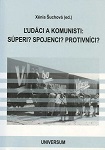Socialistická ideológia v konfrontácii s religióznym slovenským prostredím v prvej štvrtine 20. storočia (Politizácia kresťanskej tradície a sakralizácia socialistickej vízie)
Socialist Ideology in Confrontation with the Religious Slovak Environment in the First Quarter of the 20th Century
Author(s): Juraj Benko
Subject(s): Christian Theology and Religion, Interwar Period (1920 - 1939), History of Communism
Published by: SAV - Slovenská akadémia vied - Historický ústav SAV
Keywords: Socialism; Communism; Socialist Ideology; Slovakia;
Summary/Abstract: Ideologies of Socialism (Communism) and political Catholicism participated markedly in the political discourse of interwar Slovakia. Their political representations – the Social Democratic (or Communist) Party and the People´s Party – operated here as stable components of the political and public spheres. After the Republic came into existence in 1918, both ideological movements strove to reassert themselves as mass political parties in order to shape the political identity of the population by means of their own particular discourse. However, their aspirations were both stimulated and restrained by the cultural background of the Slovak, still partially urban, partially rural, society. Such an environment was held over by traditionalism and strong religiosity. The first part of the paper discusses the confrontation and conflict between the Socialist ideology and the political Catholicism both in general and at a concrete political (discursive) level. The second part is an analysis of the specific relation of the Socialist ideology to Christianity, church and religiosity in theory and praxis, and the ways of coping with this phenomenon in the Slovak society in the first quarter of the 20th century.
Book: L'udáci a komunisti: Súperi? Spojenci? Protivníci?
- Page Range: 9-23
- Page Count: 15
- Publication Year: 2006
- Language: Slovak
- Content File-PDF

